Reposted by Kostas Kampourakis
Reposted by Kostas Kampourakis
www.nature.com/articles/d41...

Reposted by Kostas Kampourakis
kampourakis.com/how-we-get-m...

Reposted by Kostas Kampourakis
Reposted by Kostas Kampourakis
Reposted by Kostas Kampourakis
Reposted by Kostas Kampourakis
Reposted by Kostas Kampourakis

cup.gr/book/ethniki...

Reposted by Kostas Kampourakis
Reposted by Kostas Kampourakis
by Rebecca Sear — Reposted by Kostas Kampourakis, Nikki Fairchild, Elizabeth Ewan
news.harvard.edu/gazette/stor...

Reposted by Kostas Kampourakis
by Kostas Kampourakis — Reposted by Kostas Kampourakis
open.substack.com/pub/kostaska...


by Kostas Kampourakis — Reposted by Kostas Kampourakis



Reposted by Kostas Kampourakis
